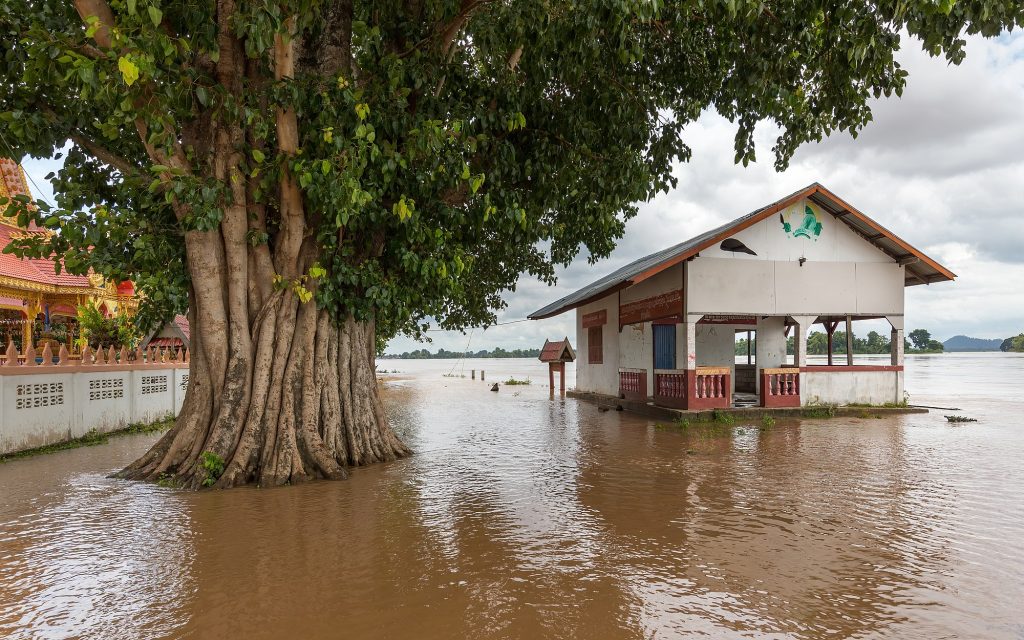
Flooding is one of the most common and destructive natural disasters affecting communities across the world. It occurs when water overflows onto normally dry land, disrupting human activities, damaging properties, and threatening lives. Understanding the causes, effects, and control measures of flooding is important not only for environmental studies but also for sustainable development and disaster risk reduction.
Table Of Contents
- Definition of Flooding.
- Causes of flooding.
- Effects of flooding.
- Prevention and Control of flooding.
- Revision Questions.
- Conclusion
Definition Of Flooding
Definition: Flooding is defined as the occurrence of excessive volume of water in areas not usually waterlogged. Flooding is also defined as the accumulation of an abnormal large volume of water in an area which has refused to percolate or flow away.
It usually occurs mostly when there is heavy rainfall in an area and all the water refuses to sink into the soil but flows on the Earth’s surface as floods. When such flood occurs in the cities, its refers Urban flooding.
Causes Of Flooding
Flooding is caused by both natural and human factors. Below are the major causes:
- Excessive rainfall in an area is a main reason or cause of flooding of river channels.
- Refuse dumping on drainages block culverts or river channels.
- Poor drainages system or lack of culverts.
- Establishment of settlement along river channels.
- Erection of buildings on water sheds, roads, culverts sites.
- Presence of steep slope in the area.
- Breakdown of dams and embarkments.
- Inadequate urban planning.
- Strong tidal waves can also cause flooding.
Effects Of Flooding
The effects of flooding can be felt across various sectors of life, and they can be classified into environmental, economic, and social impacts:
- Flooding Causes loss of lives and properties.
- It leads to the interruption of social economic activities.
- It create the health hazards by way of pollution.
- It makes human and vehicular movement difficult.
- It causes pollution of the environment due to deposition of debris.
- It washes away roads and railways.
- It leads to diversion of public funds.
- It can create the need for emergency relief supply.
- Some houses may be abandoned or rendered uninhabited because of flood.
- It can lead to deposition of silts and garbage.
- It can spread water-borne diseases.
- It leads to destruction of farmlands.
Control Of Flooding
Flooding can be controlled and minimized through both structural and non-structural measures:
- Construction of wider gutters or culverts.
- Avoid refuse dumping in water channels.
- Proper channelization of floods from city centres.
- Forest reserves on strategic water sheds.
- Public enlightenment on effects of flooding.
- Legislation against indiscriminate dumping of waste/refuse and erection of buildings in swamp areas.
- Construction of dams to act as flood reservoirs.
- Proper urban planning to avoid urban flooding.
- Environmental sanitation to drain culverts, etc.
- Regular clearance of drainage channels.
Comparison Table: Causes, Effects, and Control
| Causes of Flooding | Effects of Flooding | Control Measures |
|---|---|---|
| Heavy rainfall | Soil erosion and land degradation | Construction of dams and reservoirs |
| River overflow | Destruction of homes and roads | Improved drainage systems |
| Dam or embankment failure | Huge losses in agriculture | River channelization and dredging |
| Deforestation | Loss of biodiversity and habitats | Afforestation and reforestation |
| Urbanization with poor planning | Displacement of communities | Proper urban planning |
| Melting of ice and snow | Outbreak of waterborne diseases | Flood forecasting and early warning systems |
| Poor drainage systems | Loss of human lives | Community awareness and education |
Revision Questions on the Effects Of Flooding
- Define flooding.
- Mention four natural causes of flooding.
- List three environmental effects of flooding.
- What are two economic impacts of flooding on agriculture?
- State four control measures that can reduce the effects of flooding.
Conclusion – Effects Of Flooding
Flooding remains one of the most serious environmental challenges with devastating consequences for human life, the economy, and the ecosystem. However, by addressing its causes through sustainable practices, proper planning, and effective flood control measures, the negative impacts of floods can be reduced. Governments, communities, and individuals all have a role to play in preventing and managing flooding for a safer and more resilient society.
